
We all do it – pass gas, that is. It's the buildup of gas in our bodies known as bloating, and when it's released, we call it passing gas or, more commonly, farting. The term "fart" was coined in 1632, originating from the Old English word "feortan," meaning "to break the wind." On average, people let out gas around 14 times a day, enough to fill a balloon. So, today is the perfect day to fully embrace and celebrate Gas Pass National Day.
Yesterday marked Bean Day, and it's no coincidence as beans are notorious for causing flatulence. Other culprits include cabbage, broccoli, cauliflower, Brussels sprouts, eggs, and dairy products. These foods create pressure during digestion in the colon, leading to the release of air.
Farts are composed of various gases like nitrogen, oxygen, carbon dioxide, hydrogen, sulfur dioxide, and methane. While 99% of the gas is odorless, the remaining 1% can definitely create a stench in a room. The unpleasant odor is usually due to sulfur compounds. Foods rich in sulfur, such as eggs and meat, tend to produce more pungent farts.
Interestingly, methane and hydrogen present in farts can make them flammable. Although it might seem trivial, there have been instances, even with cows, where methane has ignited. Animals also pass gas, debunking the myth that women do it less than men. The sound and intensity of a fart vary based on the amount of gas released, the force behind it, and the tightness of one's sphincter muscles.
National Gas Pass Day Messages:
Humor surrounding flatulence isn't new. Fart jokes date back to ancient times, with records found in Sumeria around 1900 BC. Even in modern times, fart jokes find their way into entertainment, from indie films to comedy shows, and are often a part of comedic routines.
Believe it or not, some individuals have made a career out of flatulence. Le Pétomane, a renowned flatulist in late 19th and early 20th century France, and more recently, Mr. Methane, have showcased their unique talent on stage, with Mr. Methane even appearing on Britain's Got Talent. Farting has also appeared in works by famous authors like Shakespeare, Chaucer, and
Dante. Benjamin Franklin once penned an essay titled "Fart Proudly."
How to Celebrate National Pass Gas Day
Today is the day to revel in letting loose and embracing the aroma. Here are a few ways to celebrate:
Pass Gas: Enjoy foods known to increase flatulence, like beans and cruciferous veggies, to partake in today's festivities.
Conversely, if you're looking to reduce gas, use this day to explore ways to minimize fart occurrences, especially if you're already prone to frequent flatulence.
National Pass Gas Day is a lighthearted moment to acknowledge a universal and often humorous aspect of human physiology.